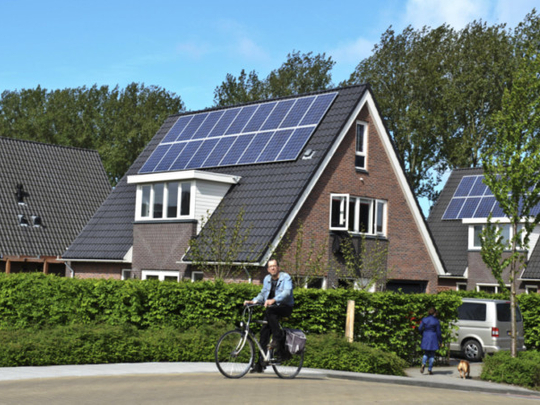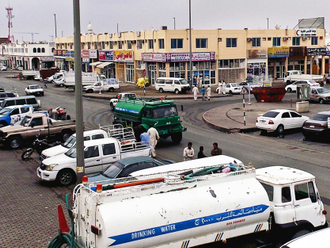
The world’s energy, water and food systems are tightly linked. While water is needed for almost all forms of energy production, energy is needed to treat and transport water, and both water and energy are needed to grow food. As the world’s growing population increases demand on all fronts, the resulting planetary stresses are becoming known as the energy-water-food nexus.
Experts at the International Water Summit (IWS) held in Abu Dhabi in January accentuated the need for countries in the Middle East to focus on this nexus for the next few decades. Dr Irina Bokova, Director General of the United Nations Educational, Scientific and Cultural Organisation, was particularly emphatic when she said changing to renewable energy was critical to keeping up with both demographic change and scarcity of resources. “Sometimes, you have to make trade-offs because one affects the other,” she said.
“This is the big challenge in the Middle East, with the water scarcity and rising population. It is important that decision-makers keep the food-water-energy nexus in mind.”
Innovative strength
No less than 11 companies from the Netherlands, in association with the country’s embassy in Abu Dhabi, collaborated on highlighting this nexus at its pavilion at the IWS. Shell, Unilever, TNO, ECN, Wageningen University (WUR), Utrecht University, Tebodin, Oxycom, WaterQ, Eijkelkamp, and Berson showcased their innovative strengths as a Dutch ecosystem that seamlessly merges the public and private sectors. Some of their efforts have great significance for the UAE and the region.
Shell has worked with the World Business Council for Sustainable Development (WBCSD) and the University of Utrecht to develop a new methodology that improves the measurement of water usage in the industry. The company is also focusing on recovering and recycling water, including waste water from communities close to their operations. In the Middle East, Shell has started using GlassPoint solar steam generators for thermal-enhanced oil recovery, which will reduce both gas consumption and CO2 emissions by up to 80 per cent.
In Oman, Shell is deploying reed beds to clean water that is produced with oil in a bid to save the energy needed to pump water back into the ground. Local communities can also reuse the water to grow crops.
Unilever aims to double the size of its business and halve its environmental impact in the next few years through its unique business model, The Unilever Sustainable Living Plan. “Businesses like ours no longer have a choice. Sustainable, equitable growth is the only acceptable model of growth,” says Paul Polman, CEO.
“We’ve found that once you start looking at product development, sourcing, and manufacturing through a sustainability lens, it opens up great opportunities for innovation and cost reduction. Growth and sustainability are not in conflict. In fact, in our experience, sustainability drives growth.”
Mass influence
In the Gulf, Unilever has taken on the challenge of decreasing the consumption of water across the life cycle of its products — from sourcing to disposal. In another plan, the company aims to influence 30 per cent of all households in the region to reduce water consumption with a comprehensive approach including education, promotions and partnerships with water utility companies.
In March, the Dubai Natural Gas Company Limited (Dugas) contracted Tebodin for the detailed design of the expansion of its methyl tertiary butyl ether plant. The Dutch multidisciplinary consulting and engineering firm also received Dugas contracts to prepare the Front End Engineering Design and Engineering Procurement Construction tender packages, and to prepare the Environmental Impact Assessment report for an additional butane storage facility. All three projects will be carried out from Tebodin’s office in Dubai.
Tebodin Middle East, which was established in 1974 in Abu Dhabi, now serves Middle Eastern clients with more than 1,500 staff from seven offices in the region.
The 50-year-old firm ECN has built up a strong international position in solar and wind energy, bio-energy, energy efficiency and policy studies. More than 60 per cent of all solar modules in the world contain ECN technology, and 80 per cent of Europe’s offshore wind farms is realised with research and support from ECN. From their Middle East office in Qatar, ECN is currently engaged in regional projects for Abu Dhabi National Oil Company, Kuwait Oil Company, Maersk Oil Qatar and Saudi Aramco.
At a global level, technology firm Oxycom has developed and patented the Oxycell X-changer, a high-efficiency heat exchanger that combines ventilation, energy-efficient indirect evaporative cooling and heat recovery in one technology — energising indoor environments through all seasons. Berson manufactures a complete range of UV disinfection systems for municipal drinking water, wastewater and reuse applications that are certified to the highest industry standards.
Global challenge
Besides showcasing cross sector and international collaboration, some of the country’s multinationals are showing exemplary leadership in addressing the global sustainability challenge. Philips, for instance, invested over €325 million (Dh1.56 billion) last year towards strengthening its LED revolution, which aims to reduce carbon dioxide emissions by switching to energy-efficient lighting. Philips also offers lighting solutions powered by renewable sources such as the sun.
A large number of distinctive Dutch research institutes have also formed strong partnerships with the government and industries, and small and medium-sized enterprises are encouraged to develop innovative concepts for addressing the nexus.
As a result, the Netherlands’ efforts are being lauded across borders and boundaries. According to the WBCSD report Water, Energy and Climate Change: “Dow Chemical’s site in the Netherlands uses household waste water that is converted into industrial water to be used as feed water for several plants. In turn, waste water from these processes is treated and used as feed water for the cooling tower. Three million tonnes of water per year that were previously discharged into the North Sea are now used two times more, resulting in 90 per cent less energy use and a reduction in CO2 emissions by 1,850 tonnes per year. From 1994 to 2005, Dow reduced waste water by 38 per cent (per pound of production) globally.”
The UAE’s progress
Dutch technology will continue to play a major role in the UAE, as firms cooperate and collaborate on a variety of projects. “The UAE has made great progress in diversifying the base of the economy, and its commitment to sustainable development shapes the country’s domestic policy as well as international cooperation,” says Paolo Cervini, Vice-President and General Manager, Philips Lighting Middle East and Turkey.
“Philips LED solutions will definitely play an important role in the country’s overall environment with an increasing share, especially for architectural applications such as bridges and facades.”
Cervini highlights the importance of discourse in the delivery of successful sustainable solutions and adds, “We continue to engage in dialogue with key stakeholders from both the private and public sectors — customers, business partners, non-governmental organisations, and national and local governments.
“Through this process we aim to create awareness of the life enhancing benefits of our intelligent, energy-efficient solutions, and power up the momentum for change.”






